In Jesus Film Project’s® Multigenerational Survey on Evangelism, we asked more than 1,600 Christians about what they thought churches and ministries should focus on when sharing the gospel. And we also asked about their personal approach to evangelism.
We asked questions like:
- How important is it that you share your faith with others?
- How do you share your faith with others?
- How often do you talk about spiritual matters with the following types of people:
– People who share your beliefs
– People who seem open to spiritual conversations, but might not share your beliefs
– People you know well, regardless of their beliefs
– People who voice beliefs you don’t agree with
It’s not surprising that people were much more likely to talk about their beliefs with those who shared them than those who did not.
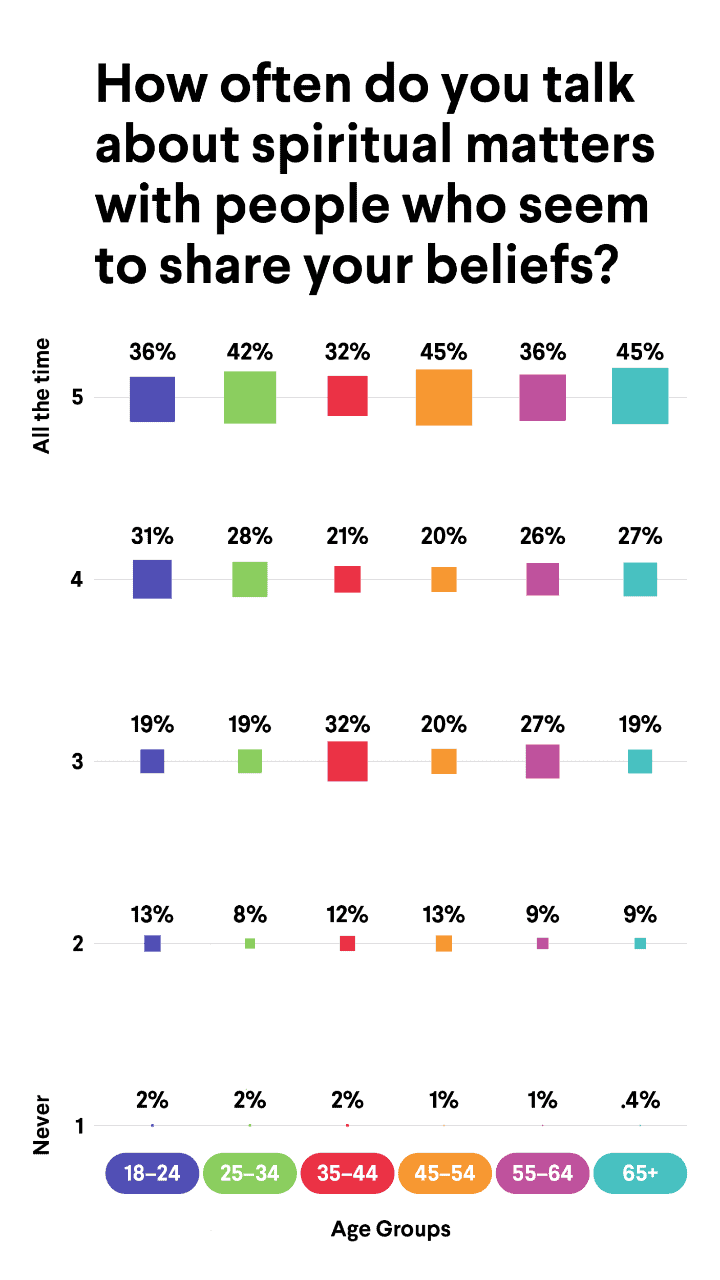
Inversely, when it came to talking about spiritual topics with people who disagree, respondents in every age group admitted that they seldom broached the subject.
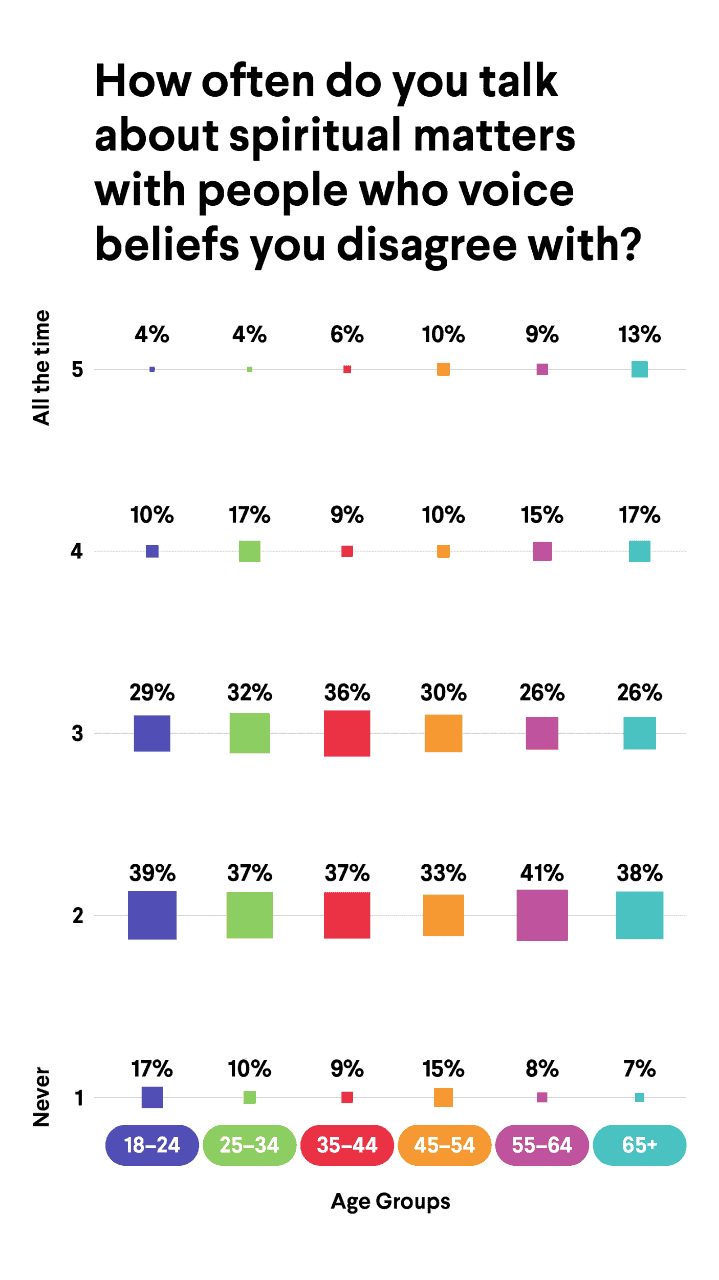
What prevents people from sharing their faith?
Some of the most revealing information came from the question, “What prevents you from talking about spiritual matters with other people?” We allowed respondents to share their own reasons why they shy away from bringing up their faith with people who may disagree with them.
After carefully combing through the responses, a few common themes emerged. The breakdown looked like this:
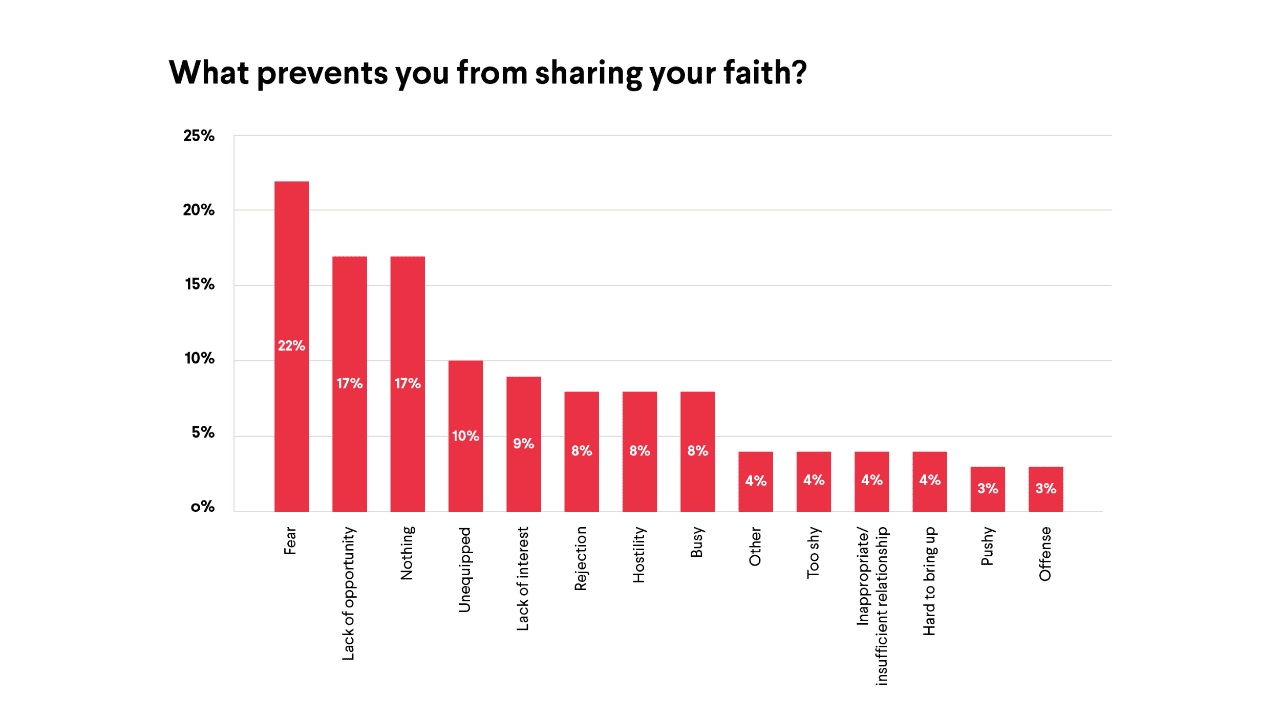
When a response fell within more than one category, we counted it for both. For instance, a response saying “I’m afraid of offending others” counted as both “fear” and “offense.”
Some response categories were so small that we didn’t include them in the graph. They include:
- Afraid of making Christianity look bad: 2%
- No prompting from the Holy Spirit: 2%
- Lack of faith: 1%
- Language barriers: 1%
- Sharing would put me in danger: 1%
- Laziness or apathy: 1%
Let’s take a few moments to examine the responses.
22% said fear keeps them from sharing their faith
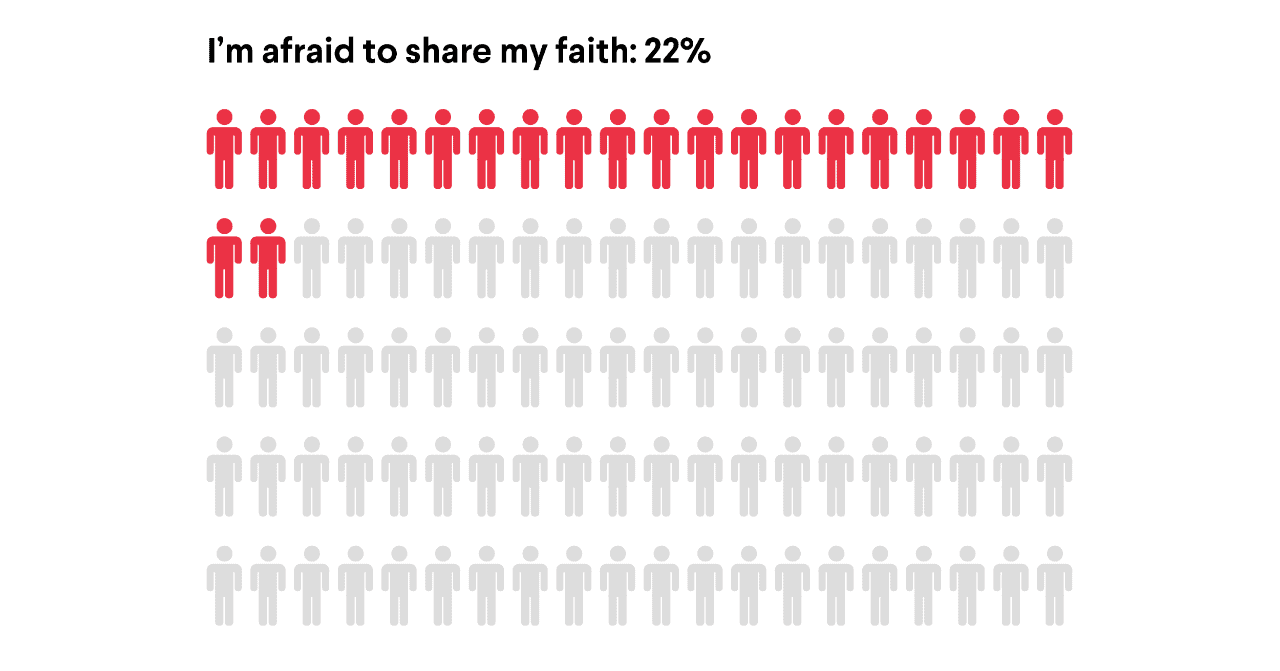
When it came to talking to other people about the gospel, fear was far and away the most significant deterrent. People communicated that they were afraid of losing valuable relationships and wanted to avoid the tensions that accompanied these kinds of discussions.
Others felt entirely ill-equipped. They’d like to share more, but they’re scared that they’ll end up fielding questions or dealing with objections too uncomfortable to navigate.
Fear is the common thread that weaves together many of the different responses to this survey. Respondents often used words like “fear,” “scared,” or “afraid,” to describe their feelings about other reasons they don’t talk about spiritual matters. For example, many responses came in along the lines of “fear of rejection,” “I’m afraid I’ll come across as pushy,” or “I’m scared to start an argument.”
Many of these fears evaporate when we realize that a person’s salvation isn’t dependent upon our performance. God is at work in everyone’s life, drawing them to Him. Our small conversations are part of that process. You might initiate that final dialogue that God uses to encourage them to trust in Jesus. Still, more often than not, your conversation will be one the Holy Spirit uses to soften their heart.
Paul addresses this when he tells the Corinthian church, “I planted the seed, Apollos watered it, but God has been making it grow. So neither the one who plants nor the one who waters is anything, but only God, who makes things grow” (1 Corinthians 3:6-7).
17% didn’t have opportunities to share their faith
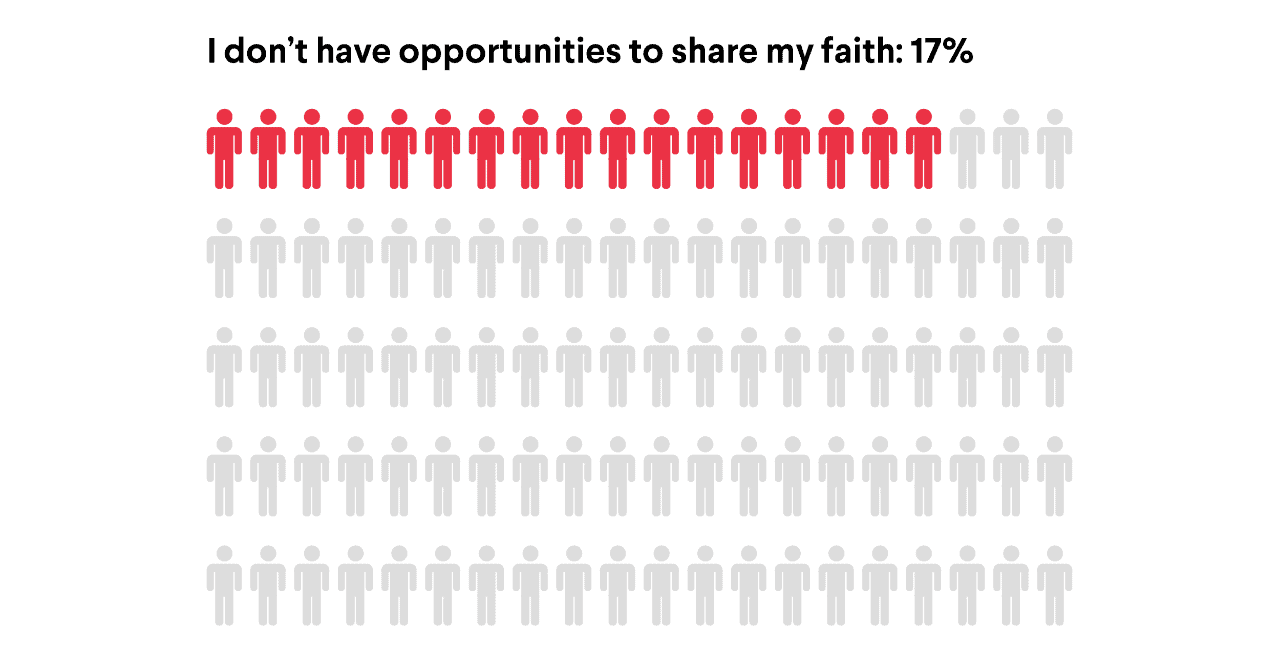
Many people responded that the ideal moment seldom presents itself. For some, physical hardships make it difficult to get out and interact with others. Most communicated that the circumstances just never seem right.
While several legitimate reasons might limit one’s opportunity to share his faith, this is often a problem associated with expectations. People are usually hoping for a clear signal that a moment is perfect. They might be expecting a certain feeling of inner peace to come when the time is right. Or it could be that they’re waiting for someone to say, “Hey, could you tell me more about what you believe?”
And while these things do happen on occasion, sharing your faith is a skill that requires some trial and error. You can learn to recognize, seize, or even create opportunities. But it’s a skill you develop through prayerful practice.
Devote yourselves to prayer, being watchful and thankful. And pray for us, too, that God may open a door for our message, so that we may proclaim the mystery of Christ, for which I am in chains. Pray that I may proclaim it clearly, as I should. Be wise in the way you act toward outsiders; make the most of every opportunity. Let your conversation be always full of grace, seasoned with salt, so that you may know how to answer everyone (Colossians 4:2-6).
17% said nothing stops them from sharing their faith
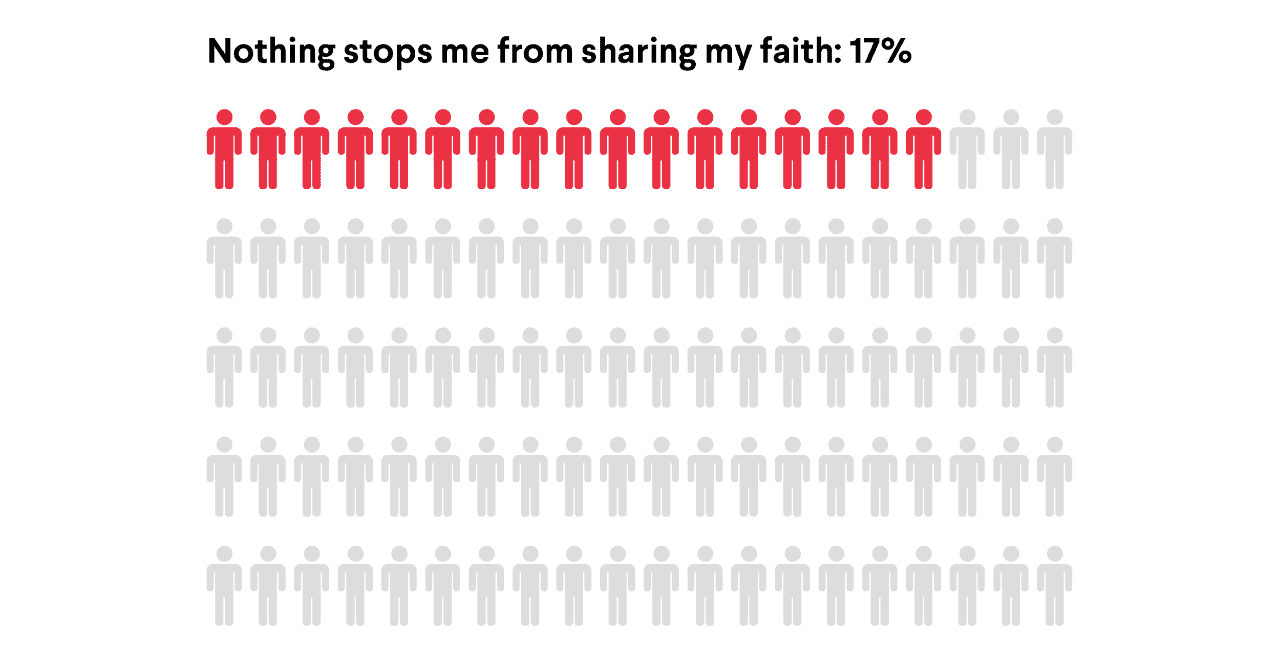
Tied for second place were people who felt they were ready to talk to anyone at any time. They gave answers like:
- I tend to talk about spiritual things a lot and have conversations with my neighbors sometimes.
- Nothing prevents me from talking to others.
- “En verdad considero que no tengo ningún impedimento.” (I truly believe that I have no impediment.)
- I always share spiritual matters with other people.
It’s exciting to see so many who jump at any chance to tell others about Jesus. When this kind of zeal is mixed with prayerful discernment, amazing things happen.
But in your hearts revere Christ as Lord. Always be prepared to give an answer to everyone who asks you to give the reason for the hope that you have. But do this with gentleness and respect (1 Peter 3:15).
10% didn’t feel equipped to share their faith
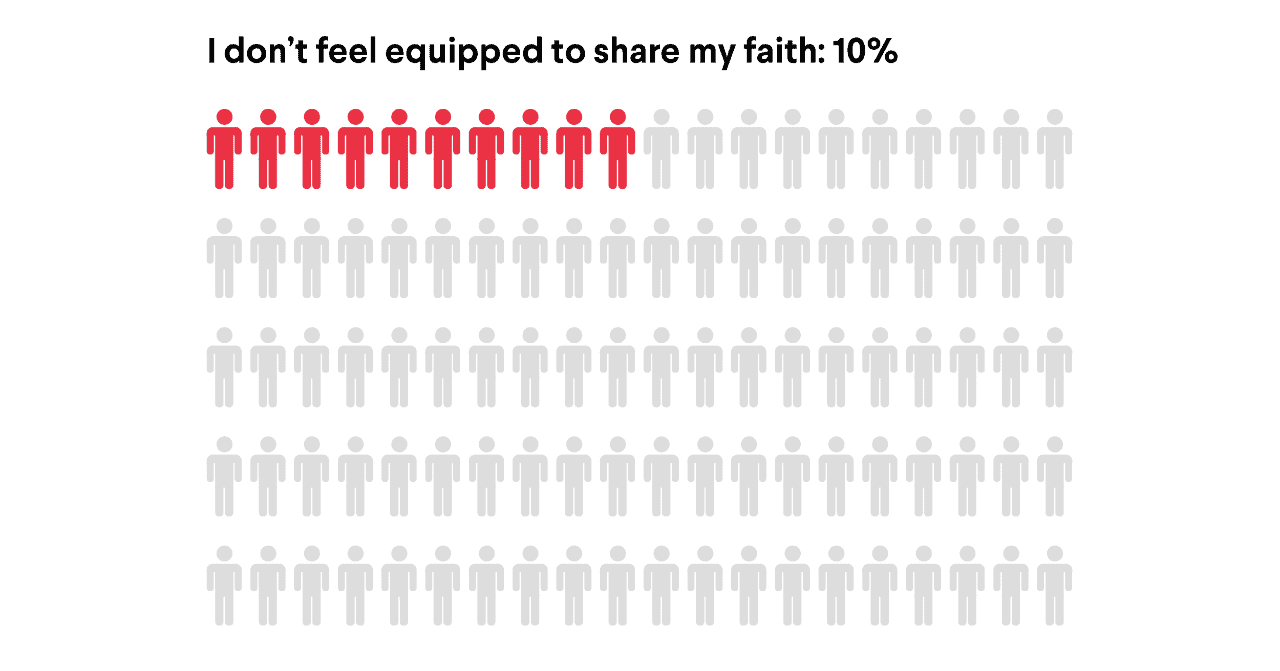
Every tenth respondent in our survey indicated that they didn’t feel equipped to share their faith. They stated that they worried about fielding questions they couldn’t answer or not having the required biblical knowledge. This is where the church comes in.
More than once, Jesus sent His disciples out to share the good news with surrounding villages. Preparing His followers to do the work of evangelism was a high priority. He knew that eventually, He’d give them the Great Commission and send them into the world as His witnesses.
Churches should recognize the importance of preparing Christians to share their faith. This means equipping them through training and teaching. But it also means encouraging and preparing them to trust God and step out in faith. Because ultimately, God will use our imperfect efforts-and it’s through practice that we grow in confidence.
For we are God’s handiwork, created in Christ Jesus to do good works, which God prepared in advance for us to do (Ephesians 2:10).
9% said others weren’t interested in their faith
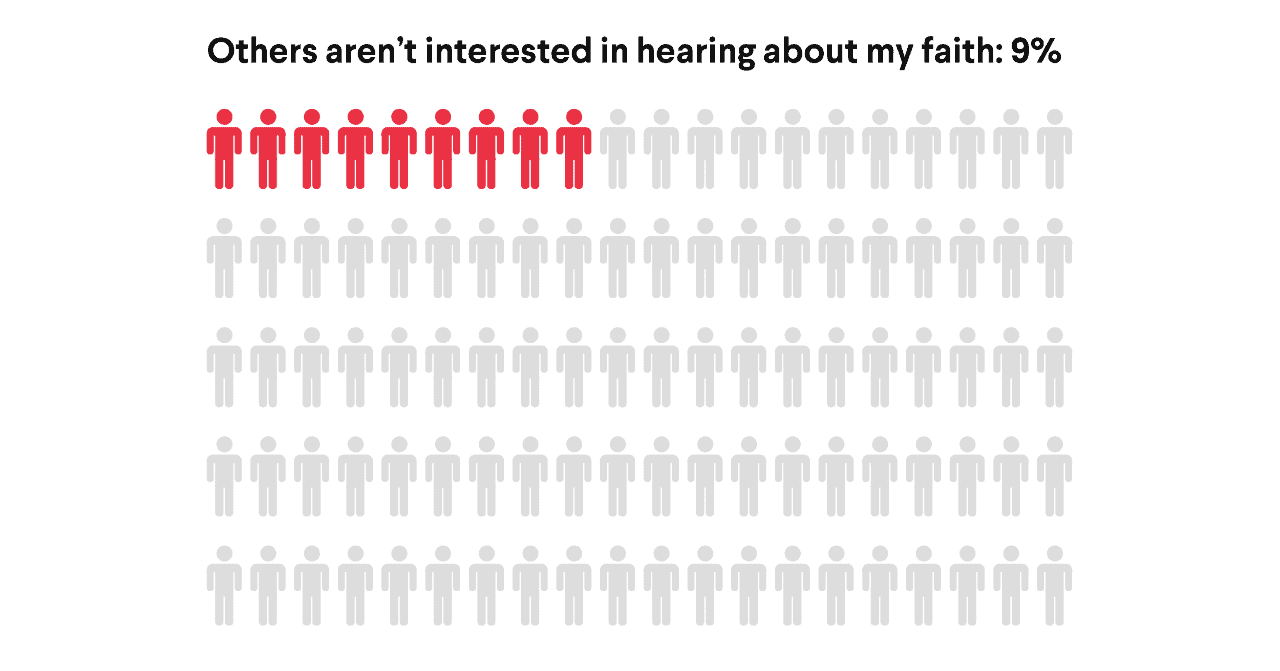
When it comes to talking to others about Jesus, a lack of interest is a real deterrent. No one wants to share something meaningful when it’s evident that the other party just wants the conversation to end. This is the reason our spiritual fruit is so critical.
Imagine you had a friend who sold cleaning products. Every time you saw them, they were trying to get you to buy their wonder-working stain remover. After a while, you’d do anything to avoid their awkward sales pitch. But what if your friend was able to remove a terrible ink stain from your favorite white shirt? Suddenly, you’d be more open to hearing about this cleaner.
In the same way, our transformed lives should help inspire interest in our testimony. Our values and behavior should go before us. This was what Jesus was getting at when He said, “By this everyone will know that you are my disciples, if you love one another” (John 13:35). People need to hear the gospel message, but we should pique their interest by the example we give.
But the fruit of the Spirit is love, joy, peace, forbearance, kindness, goodness, faithfulness, gentleness and self-control. Against such things there is no law (Galatians 5:22-23).
8% feared rejection for sharing their faith
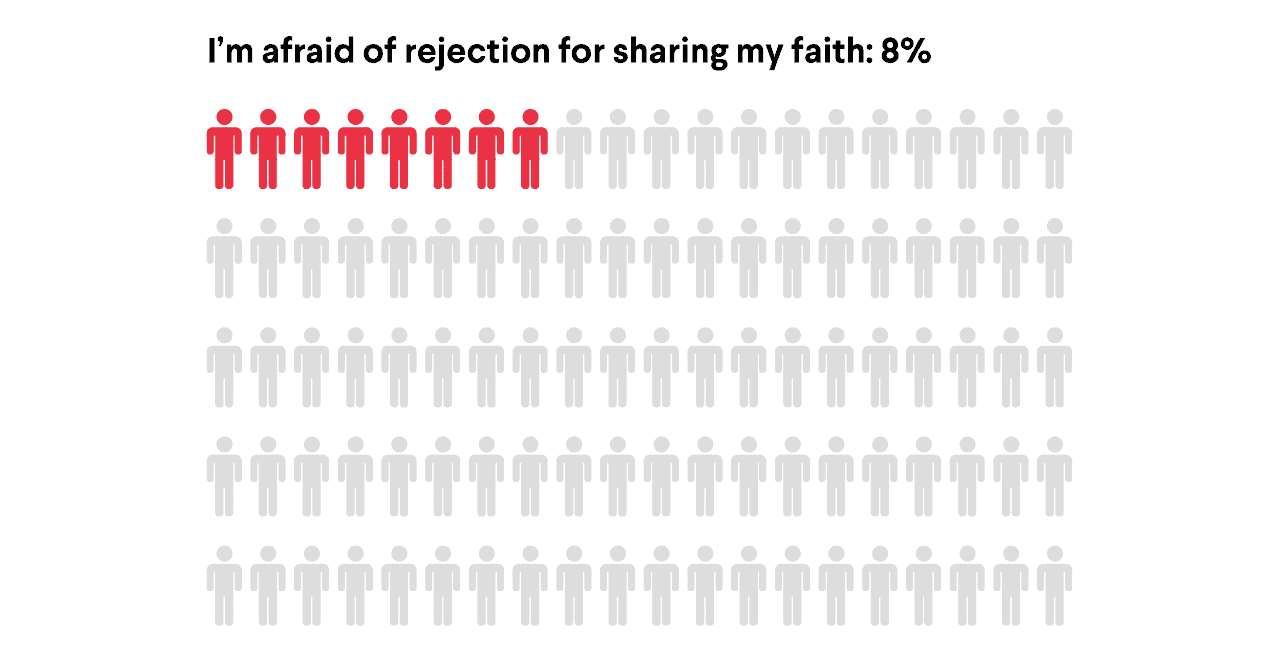
Rejection can take many forms. In some instances, it can feel like abandonment as people go out of their way to avoid you. More often than not, it’s having someone cut you off mid-sentence to say, “I’m not really interested in hearing about this.” That feeling of awkwardness can make it hard to speak up when the next opportunity presents itself.
We must recognize that dealing with rejection is part of the Christian experience. Isaiah prophesied that the coming Messiah would be “despised and rejected by mankind, a man of suffering, and familiar with pain. Like one from whom people hide their faces he was despised, and we held him in low esteem” (Isaiah 53:3).
Jesus promised that His followers would experience rejection, too. He never downplayed the hurt that rejection causes. Still, He encouraged us to focus on the rewards, “And everyone who has left houses or brothers or sisters or father or mother or wife or children or fields for my sake will receive a hundred times as much and will inherit eternal life” (Matthew 19:29).
Fear tells us that sharing our faith will get us rejected, but it doesn’t happen that often. But that doesn’t mean it isn’t a legitimate risk. Sometimes following in our Savior’s footsteps means taking a chance that others might turn away from you.
Whoever listens to you listens to me; whoever rejects you rejects me; but whoever rejects me rejects him who sent me (Luke 10:16).
8% feared hostility for sharing their faith
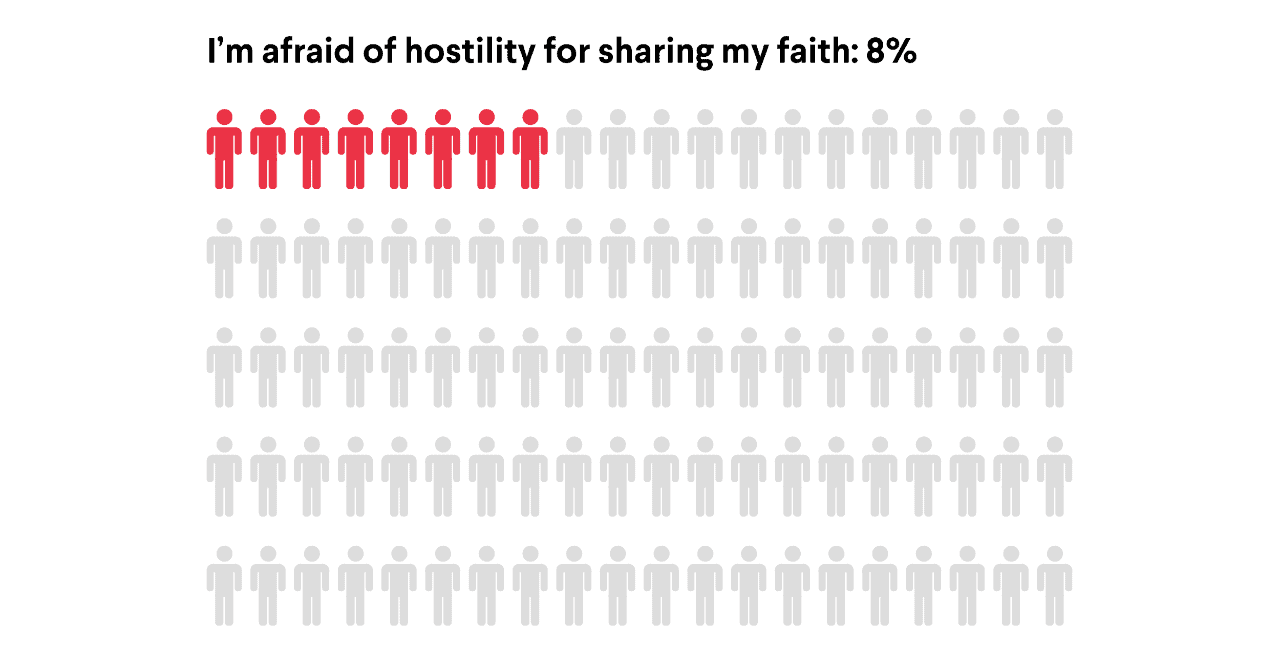
We can never be entirely sure how someone will respond to the gospel. Sometimes people catch us off guard by reacting with frustration or anger.
Maybe they’ve had a bad experience with the church, and it’s left them bitter. Or perhaps they’ll respond with resentment at the conviction of the Spirit. You never know how people will react, and that can be nerve-wracking. If you’ve experienced hostility from sharing your faith, it can make you hesitant to try again.
This is one reason why we should be careful and gentle in our interactions. Paul explained his process to the Thessalonians, “we were like young children among you. Just as a nursing mother cares for her children, so we cared for you. Because we loved you so much, we were delighted to share with you not only the gospel of God but our lives as well” (1 Thessalonians 2:7-8).
We can’t control how others respond, but we can control our presentation. We’re like forest rangers coming upon someone who’s been lost in the wilderness for weeks. They’re starving, but if we overdo it, their body will reject the nourishment and they’ll get violently ill. We’re feeding malnourished souls, and we need to be tender and careful in our manner.
So in everything, do to others what you would have them do to you, for this sums up the Law and the Prophets (Matthew 7:12).
8% were too busy to share their faith
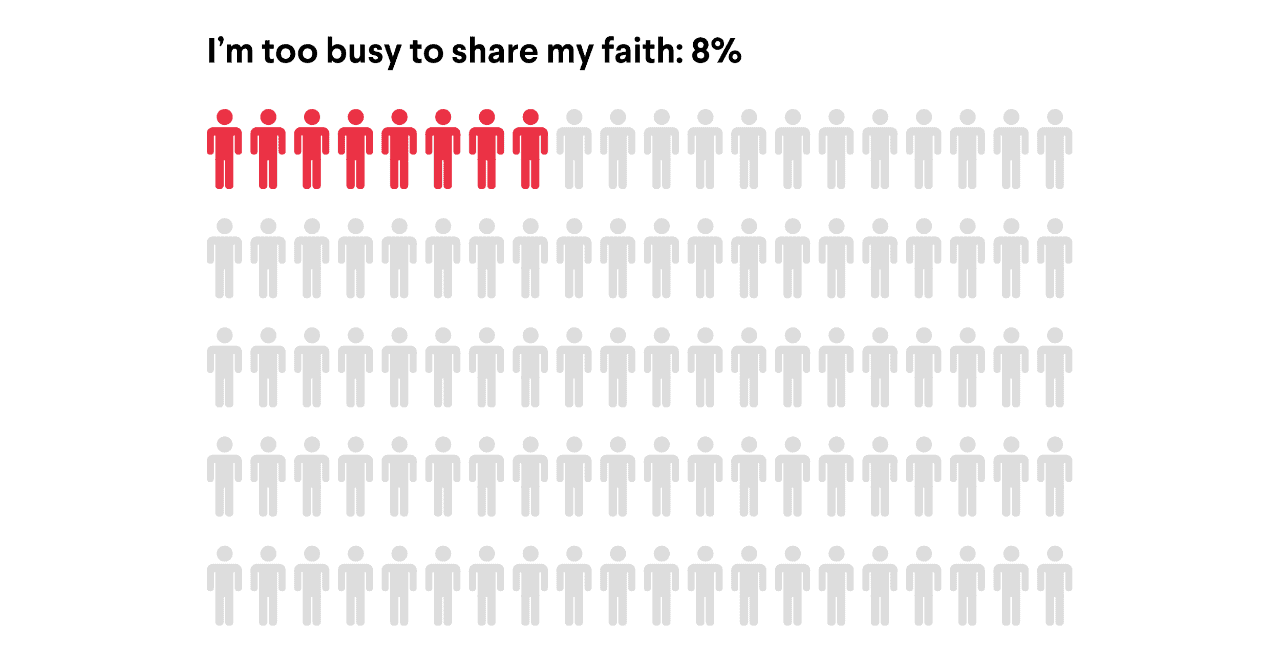
A lot of people responded that they just didn’t have the necessary time it takes to share the gospel. In their mind, evangelism is potentially time-consuming, and their lives are busy enough as it is. Too often, busyness is a way we excuse things that we haven’t bothered to prioritize. When we’re tempted to justify ourselves as too busy to share our faith, we need to consider a couple of things.
First, we need to ask ourselves if we’re using busyness as a cover for apathy. We all have the same amount of time, and we find time for the things that are important to us. We also need to ask if we have faith that God can provide us with the time we need to do His work.
The pace of modern life is harried, but we must make time for the critical work of expanding the kingdom. For most people, evangelism is done as they go through their typical day. They’re demonstrating the love of Jesus, and they’re looking for (and creating) opportunities to share their faith.
But seek first his kingdom and his righteousness, and all these things will be given to you as well (Matthew 6:33).
4% were too shy to share their faith

In his letter to the church of Ephesus, Paul talks about how God equips the church:
So Christ himself gave the apostles, the prophets, the evangelists, the pastors and teachers, to equip his people for works of service, so that the body of Christ may be built up (Ephesians 4:11-12).
In the middle of this list, Paul indicates that there are people who have a unique ability to share the good news. They tend to be extroverted and enjoy talking to others about Jesus. And while there are people for whom evangelism comes naturally, we’re all called to share. It’s OK that you don’t feel entirely comfortable knocking on a stranger’s door to talk about Jesus-God does not call everyone to do that.
A lot of people are uncomfortable talking about their faith with others. It feels like a high-stakes conversation. If you’re shy, you should choose your opportunities carefully, but be careful not to make introversion an excuse to keep the good news to yourself. If someone was ill and you knew how they could get life-saving medicine, you wouldn’t allow shyness to get in the way. We just need to have faith that the benefit of knowing Jesus outweighs our discomfort.
For God did not send his Son into the world to condemn the world, but to save the world through him (John 3:17).
4% couldn’t find an appropriate time to share their faith
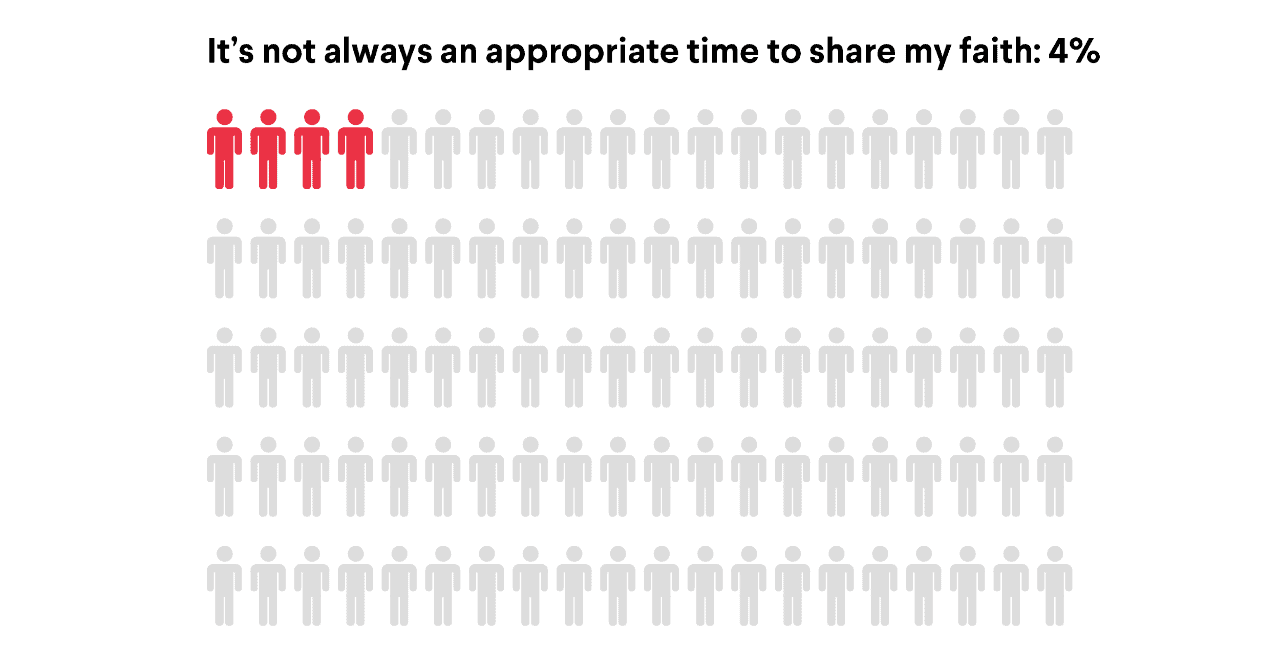
Many people communicated that they didn’t share their faith because it felt inappropriate. Some people didn’t want to share their faith at work, or they didn’t feel like relationships were in a healthy enough place to talk about Jesus. These are valid concerns.
Most work environments aren’t the best place for these kinds of conversations. Employers don’t want their employees to feel uncomfortable at work, and faith-based discussions can lead to people feeling harassed or even filing hostile work environment claims.
But this helps us recognize that many Christians feel like there’s no appropriate time to share their faith because they’re not close to many non-Christians. After being a Christian for a while, many people’s social circles become largely Christian-centric. There aren’t a lot of places where they interact with folks who don’t share their faith. So, for many, work is the only place where they interact with non-Christians.
The answer isn’t that people need to feel more comfortable proselytizing at work. Jesus would be better served if more Christians found ways to expand their circles beyond other Christians. If we’re modeling our lives after Jesus, we’re going to find ways to invite others into our circles.
Neither do people light a lamp and put it under a bowl. Instead they put it on its stand, and it gives light to everyone in the house. In the same way, let your light shine before others, that they may see your good deeds and glorify your Father in heaven (Matthew 5:15-16).
4% didn’t find it easy to bring up faith
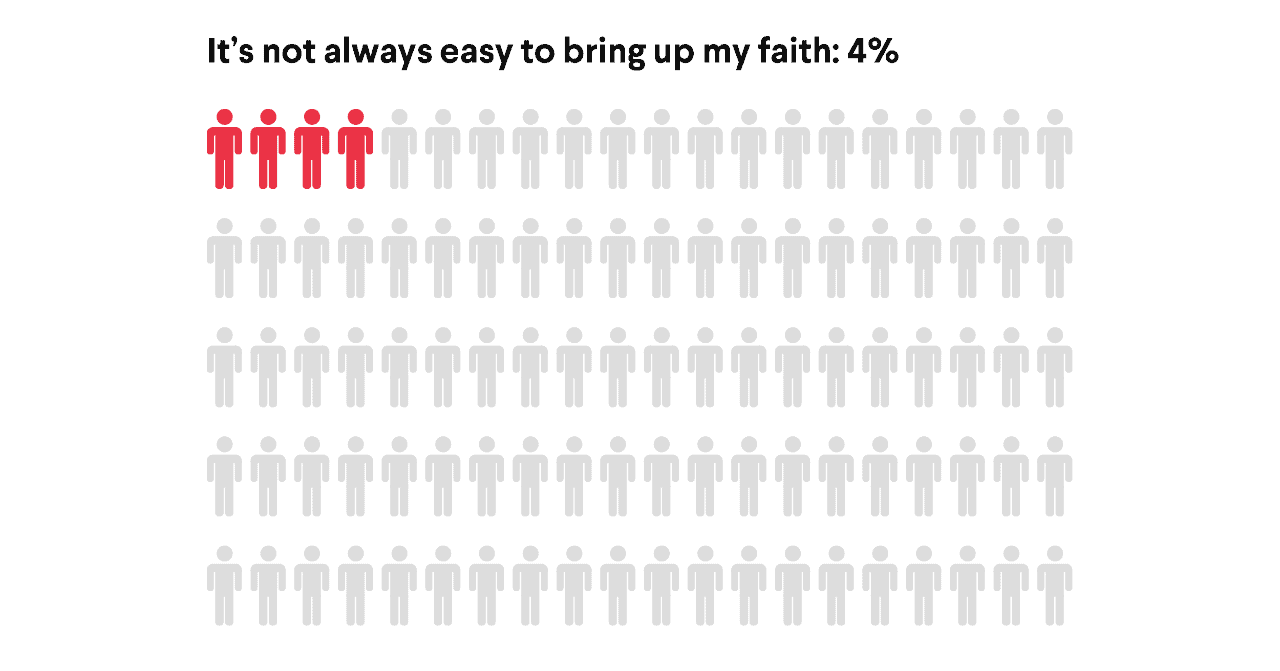
How do I steer a conversation toward Jesus? That’s the question many people struggle with. It can feel tricky to segue a discussion toward faith issues without making it feel forced and awkward. If you don’t know how to do it well, witnessing can be very uncomfortable.
Trying to make this transition feels so unpleasant that people abandon the idea of sharing their faith altogether. The problem is that we often think of faith as a topic that people aren’t interested in or one that has no practical value.
Listening and asking questions are keys to bringing up faith in a natural way. When we’re focused on how we can turn a conversation into an evangelistic opportunity, the transition will always feel forced. But when we’re genuinely interested in getting to know others and learn about their story, we discover all sorts of natural opportunities to share the good news.
Preach the word; be prepared in season and out of season; correct, rebuke and encourage-with great patience and careful instruction (2 Timothy 4:2).
3% didn’t want to come across as pushy for sharing their faith
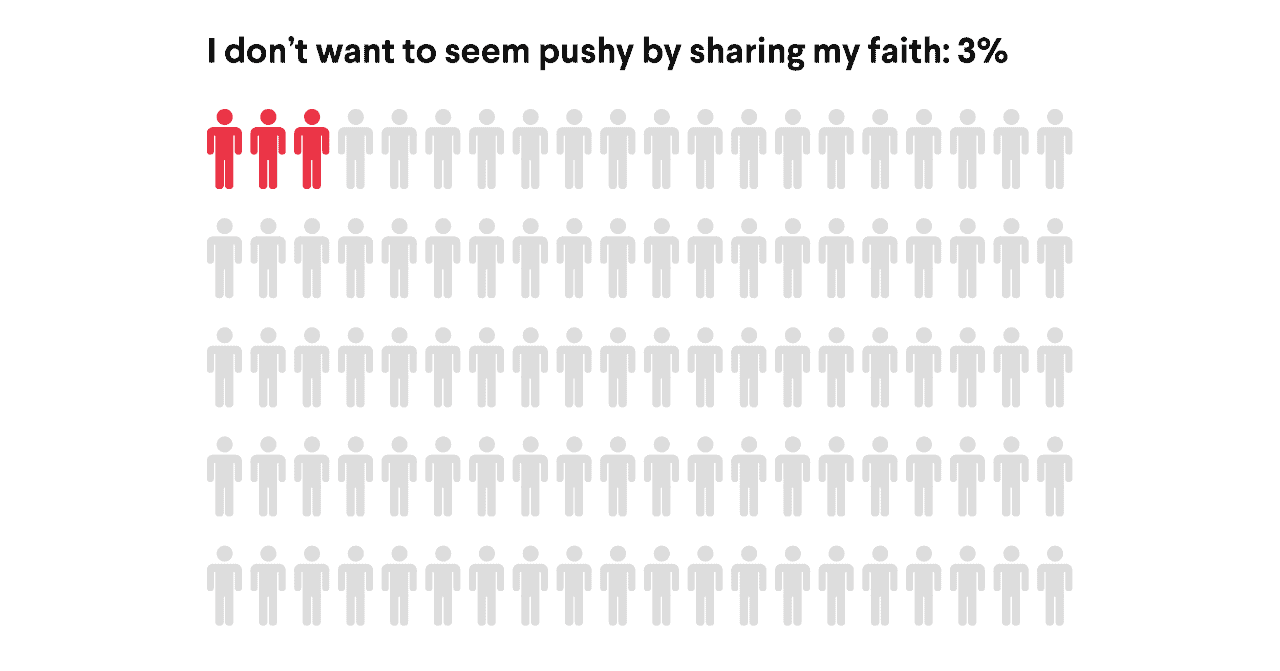
No one likes to feel cornered and badgered. Empathetic Christians tend to feel genuine concern about putting others in a frustrating or embarrassing position. The problem enters when we project uncomfortableness on others before we ever talk to them.
There’s a massive difference between being bold and being pushy. The difference lies in our ability to read others. We want to pay attention to opportunities while gauging the people’s receptivity. This helps us recognize when to engage and when to back off. It takes some work to learn how to listen effectively, and that comes through practice.
Sometimes we need to be willing to do it poorly to learn how to do it effectively.
Yet to all who did receive him, to those who believed in his name, he gave the right to become children of God (John 1:12).
3% didn’t want to offend others by sharing their faith
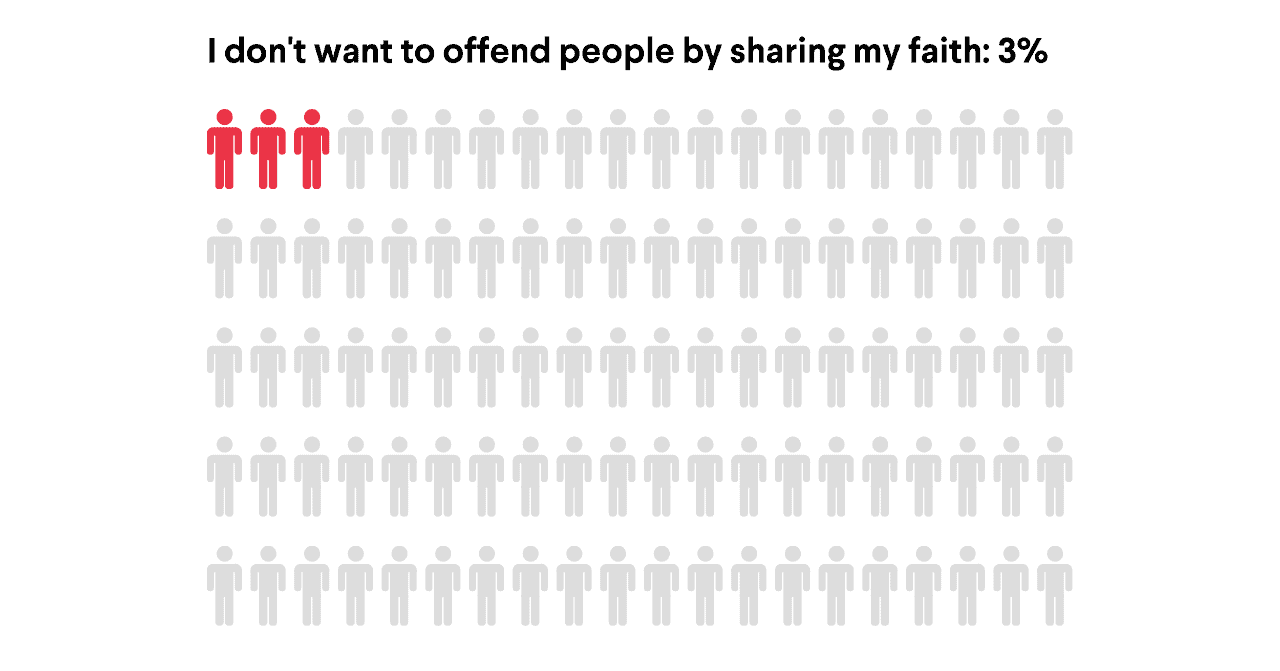
Similar to the worry of being too pushy is the fear of offending others. No one wants to be offensive, and there’s a real fear that sharing our faith can be offensive to others. After all, even Jesus promised that His words would cause division.
We need to remember that a lot of the time, it’s not the gospel that offends. It’s the way we’re sharing it. When we think of our job as converting someone, it can make the whole process feel a little disrespectful. Luckily, it’s the Spirit that draws someone to Jesus. Our job is to share the good news, which doesn’t have to be confrontational or difficult.
As Christian author Brennan Manning once explained it, “Evangelism is just one beggar telling another where they found bread.”
For it is by grace you have been saved, through faith-and this is not from yourselves, it is the gift of God – not by works, so that no one can boast (Ephesians 2:8-9).
Pray for workers to bring in the harvest
Matthew’s Gospel tells us that Jesus had great compassion for the people that He taught and healed. The Lord looked at them and saw people who were harassed and helpless-like sheep without a shepherd. Matthew tells us that Jesus responded by telling His disciples, “The harvest is plentiful but the workers are few. Ask the Lord of the harvest, therefore, to send out workers into his harvest field” (Matthew 9:37-38).
We, too, should be praying for workers to help bring in the harvest. But like the disciples, we should recognize that we’re those workers. The prayer for harvesters is a prayer that our hearts would be pliable and ready to respond to God’s leading. Remembering that we’re not being told to create converts, we’re being asked to share the good news. It’s God who will turn people’s hearts.
We are all missionaries
God’s commission is to grow and expand His kingdom throughout the world, which means that we’re missionaries everywhere we find ourselves.
If you’re looking for resources to help you share about Jesus, explore our media library for multi-language films that will help you break down barriers and start conversations about the gospel.
Plus, if you’re ready to learn how you can make a bigger impact in the Great Commission, download a free copy of “We Are All Missionaries.” This four-week, discussion-based curriculum is a fantastic way to get your small group or youth ministry talking about what it means to share the gospel.
